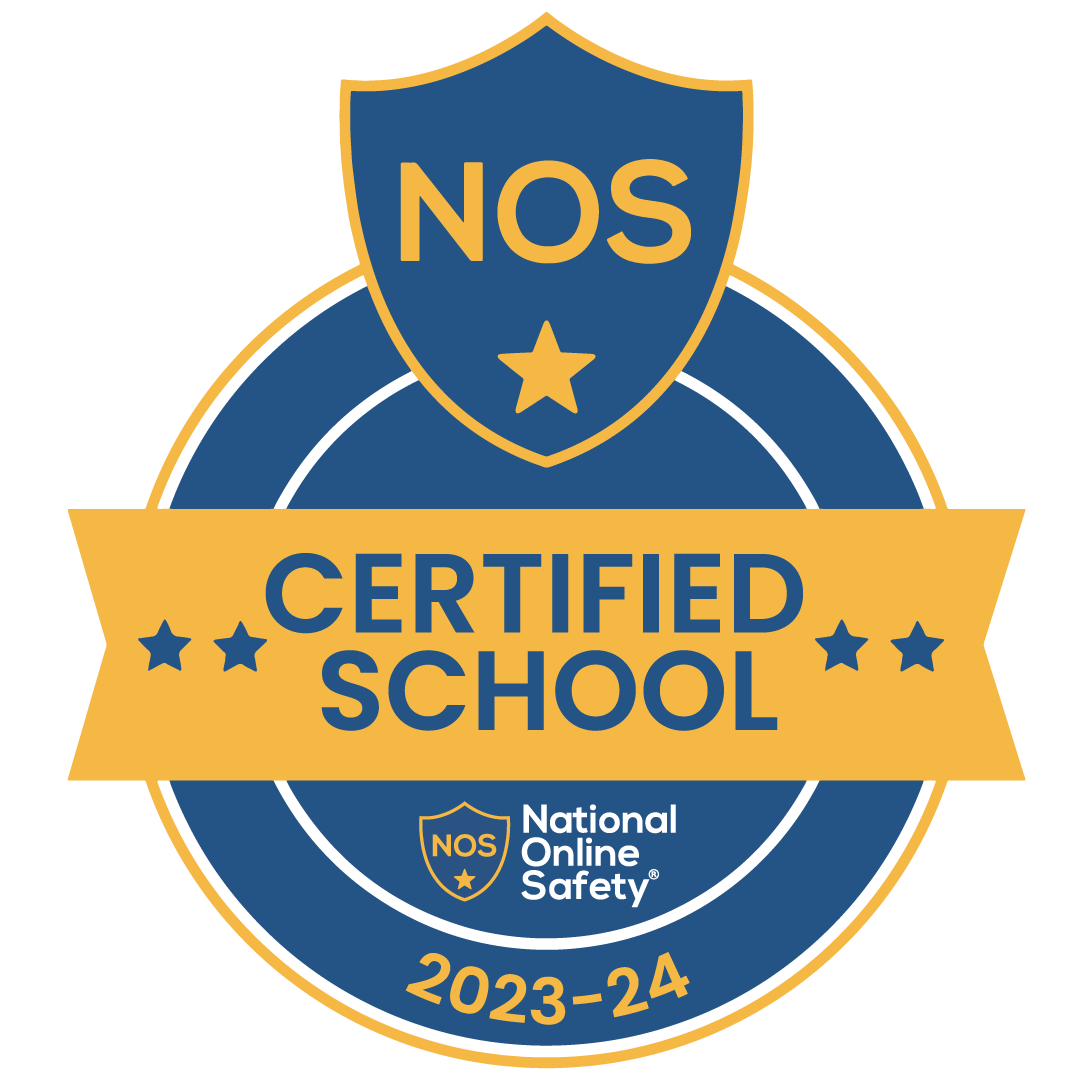Music
Department Staffing & Roles
The music department consists of one full time member of staff who is responsible for classroom teaching, leadership and management of the department as well as one part time member of staff who is a classroom teacher. The department also liaises with external peripatetic teachers who provide peripatetic lessons for some students.
- Mr M Buckley – Head of Music
Visiting Peripatetic Staff
- Vocal Tutor : Mr A Moore
- Drum Tutor : Mr J Cazza
- Guitar Tutor: Mr M Lynch
- Woodwind Tutor : Mr J Lewis
- Piano Tutor: Mrs K Lewis
To provide a safe and inclusive environment which nurtures students’ passion, understanding and appreciation of music from a range of cultures, whilst ensuring progress is made in the three main musical skills performing, composing, listening & appraising. Teachers will also endeavor to ensure that students develop the ability to express themselves in a creative, meaningful and healthy way through music, both inside and outside of the classroom. Hear it, Play it, Create it.
Intent:
- To provide inclusive and accessible musical opportunities for all students
- To ensure students can express themselves in a safe and welcoming environment
- To provide inclusive and accessible musical opportunities for all students
- To ensure students can express themselves in a safe and welcoming environment
- To nurture students love for music and provide challenge in every lesson
- To ensure students make excellent progress in music
- To build confidence by performing music in and out of the classroom
- To develop listening and analytical skills by identifying key features of music in a range of styles
- To develop an understanding and appreciation of the various types, styles, and forms of music from a range of different cultures
- To encourage students to establish links between music and its context throughout history
- To develop composition skills by creating music in a range of genres and notational formats
- To provide extra-curricular activities and wider opportunities to engage with music in different contexts, including performing in front of an audience
- To provide opportunities for students to perform and compose music both independently and as part of a team
- To ensure all students believe that they can achieve
Key Stage Three
The Music curriculum at OCA aims to ensure that all pupils:
- Broaden their musical experience and interests, develop imagination and foster creativity
- Learn to sing and use their voices
- Learn a range of small musical instruments
- Develop confidence as a performer and be able to respond to feedback in order to improve
- Develop creativity by experimenting with a range of compositional ideas
- Compose music individually and with a group
- Compose using a range a notations including staff notation
- Use technology to create music
- Listen to music from a wide range of musical styles and eras, including world music
- Understand how music and the instruments used have developed over time
- Aurally identify features of music including pitch, tonality, duration, dynamics, tempo, timbre, texture and structure
- Develop as an independent learner with an enquiring mind
- Engage and appreciate the diverse heritage of music in order to promote personal social, intellectual and cultural development
- Critically appraise their own and others work to develop both their understanding and attainment in music
Pupils receive one lesson of music a week in Year 7 and Year 8. In Year 9, Music is taught as part of the Performing Arts rotation, which includes one lesson a week for 8 weeks. The music curriculum has been created in order to develop the three main musical skills, performing, composing and listening & appraising, by exploring music from a range of different styles and contexts. Skills required for GCSE Music and NCFE Music Technology underpin the curriculum, ensuring students are effectively prepared for the subject when they reach year 10.
Students in year 7 explore the elements of music through several different musical mediums. They use their voices, develop their instrumental skills by learning to play the keyboard, ukulele and singing as well as using technology including Garageband to compose and create music. Listening skills are developed by identifying features of music from different styles and eras.
The course content for Year 8 reinforces the foundation of knowledge, experience, understanding and skills developed in Year 7. Students develop instrumental skills on the keyboard as well as learning to play the guitar and samba percussion. Composition skills continued to be developed by using Garageband / Logic Pro X to create original music and listening activities focus on identifying specific features of the melody and harmony.
In year 9, students will continue to develop the core skills in music while also developing skills that will be required by any student that may wish to pursue music at key stage 4. This will include developing ensemble performance skills and composing.
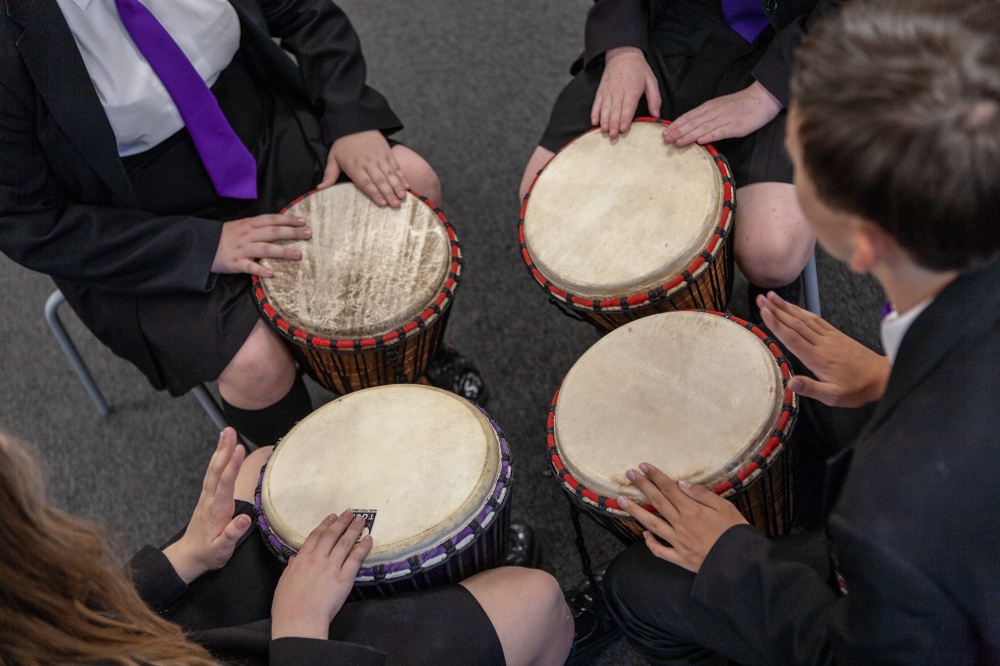
KEY STAGE FOUR – AQA GCSE MUSIC
The Music curriculum at OCA aims to ensure that all pupils:
- Broaden their musical experience and interests, develop imagination and foster creativity
- Develop performing skills on their chosen instrument/voice both individually and as an ensemble
- Communicate musically with other performers to ensure there is a sense of unity in fluency, control and expression in ensemble performance
- Develop confidence as a performer and be able to respond to feedback in order to improve
- Develop composing skills, learning how to create rhythmic, melodic and harmonic ideas
- Compose music individually that has a clear structure and sense of direction
- Develop musical ideas over time utilising traditional compositional techniques
- Use technology to compose, utilising appropriate sequencing and notation software
- Recognise links between performing, composing and appraising and how these inform the development of music
- Develop knowledge of musical terminology and skills to effectively communicate as a musician
- Listen to and identify key features of music from a range of genres and eras, developing understanding of musical chronology.
- Develop as an independent learner with an enquiring mind
- Engage and appreciate the diverse heritage of music in order to promote personal social, intellectual and cultural development.
- Critically appraise their own and others work to develop both their understanding and attainment in music
What will I study?
During the course you will develop your performing, listening and composition skills.
Component 1: Understanding Music (40%)
At the end of the course, you will sit a listening exam that lasts 1 hour and 30 minutes. You will answer a variety of questions about music from the 1600s to present day and will learn about each area of study by taking part in practical, interactive activities. To support this area of the course, you will visit The Beatles Story in Liverpool and watch orchestras such as The Hallé Orchestra perform the set works.
Component 2: Performing Music (30%)
You will produce two performances – a solo performance and an ensemble performance. Throughout the course, at least one hour a week will be dedicated to developing your performance skills. You will form ensembles such as rock bands and have the opportunity to perform in assemblies and concerts. GCSE music students are given free individual instrumental lessons and will have access to our state of the art recording studios.
Component 3: Composing Music (30%)
You will compose two pieces of music. One is based on a composition brief and the second composition can be about anything you like! Compositions are completed using professional music software such as Sibelius, Garageband and Logic Pro, while also using our Sound Engineer to help with live recordings which may be submitted.
Instrumental Lessons and Enrichment
Students have the opportunity to receive a twenty minute instrumental lesson on voice, drums, guitar, woodwind and piano. All students are encouraged to attend the wide range of enrichment activities on offer at OCA including choir, music practice club and various student-lead school bands. Enrichment activities during the school day are limited by the timetable and split lunchtimes. Monday and Friday after school clubs are being developed, as well as a Year 7 Choir on Thursday lunchtime.
KEY STAGE FOUR – NCFE LEVEL 2 TECHNICAL AWARD IN MUSIC TECHNOLOGY
What will I study?
During this course, you will study general musicianship skills, as well as developing an understanding of technology used in the music and recording industry. You will study four units:
Unit 1: Using a Digital Audio Workstation
This unit allows learners to develop skills in operating a DAW creatively using audio, MIDI, hardware and editing tools. You will create a project in response to a brief, reflecting industry skills.
Unit 2: Creating Music
Learners will develop skills to analyse stylistic elements of music and develop a piece of music based on a specific style.
Unit 3: Studio Recording
Learners will plan and undertake a recording session for a given scenario. Learners will create a mixdown of their recording and review the final product.
Unit 4: Sound Creation
Learners will explore sound creation and apply their knowledge to a given brief. You will create and review your own original sound creation project.
How will I be assessed
50% Internal Assessment – a portfolio of your work produced in class.
15% Listening Test – a listening exam that asks a variety of questions relating to all four units covered in the course.
35% Practical Test – a practical exam relating to the operation of software
Homework
We aim to set homework that stretches and challenges students so they make further progress. Homework should be used to allow students to recap and consolidate their learning as well as acquire more knowledge. Homework is set once a week for students in Key Stage Three and this will be completed in their homework booklets. Students in Key Stage Four will be set a key word test, at least thirty minutes of practise and a listening question each week.
Students must make a written note of their homework and check Show My Homework regularly for more information. If students do not understand the requirements of their homework, they must speak to their subject teacher.
Marking
Within the department we aim to provide all students with timely, high quality feedback on the work they are producing in lesson and at home. Our marking provides information regarding how well students performed during a particular piece of work, their progress to date and feedback on their effort and AtL. Students should then respond in a positive manner to this by improving their work to ensure they make further progress.
KS3 – At KS3, SoW are delivered in 6 week blocks. At the end of every lesson, students self-assess using their success criteria trackers for each topic, stating the grade that they achieved in the lesson and the steps that they need to take to achieve the next grade. Students peer-assess performances twice a half term and give verbal feedback.
KS4 – At KS4, SoW can vary in length. We will deep mark every 6 lessons. The deep mark will take place following an assessment, essay, homework or exam question(s). Following this deep mark, students will respond to targets set to improve their work. The teacher will then check these improvements and where appropriate, re grade work.
What will I study?During this course, you will grow as a musician by developing your performing, listening and composition skills.
Component 1: Understanding Music (40%)At the end of the course, you will sit a listening exam that lasts 1 hour and 30 minutes. You will answer a variety of questions about music from the 1600s to present day and will learn about each area of study by taking part in practical, interactive activities. To support this area of the course, you will visit The Beatles Story in Liverpool and watch orchestras such as The Hallé Orchestra perform the set works.
Component 2: Performing Music (30%)You will produce two performances – a solo performance and an ensemble performance. Throughout the course, at least one hour a week will be dedicated to developing your performance skills. You will form ensembles such as rock bands and have the opportunity to perform in assemblies and concerts. GCSE music students are given free individual instrumental lessons and will have access to our state of the art recording studios.
Component 3: Composing Music (30%)You will compose two pieces of music. One is based on a composition brief and the second composition can be about anything you like! Compositions are completed using professional music software such as Sibelius and Logic Pro.
Key Stage Four – NCFE Level 2 Technical Award in Music Technology
What will I study?
During this course, you will study general musicianship skills, as well as developing an understanding of technology used in the music and recording industry. You will study four units:
Unit 1: Using a Digital Audio Workstation
This unit allows learners to develop skills in operating a DAW creatively using audio, MIDI, hardware and editing tools. Learns will create a project in response to a brief, reflecting industry skills.
Unit 2: Creating Music
Learners will develop skills to analyse stylistic elements of music and develop a piece of music based on a specific style.
Unit 3: Studio Recording
Learners will plan and undertake a recording session for a given scenario. Learners will create a mixdown of their recording and review the final product.
Unit 4: Sound Creation
Learners will explore sound creation and apply their knowledge to a given brief. They will create and review their own original sound creation project.
How will I be assessed
- 50% Internal Assessment – a portfolio of your work produced in class.
- 15% Listening Test – a listening exam that asks a variety of questions relating to all four units covered in the course.
- 35% Practical Test – a practical exam relating to the operation of software
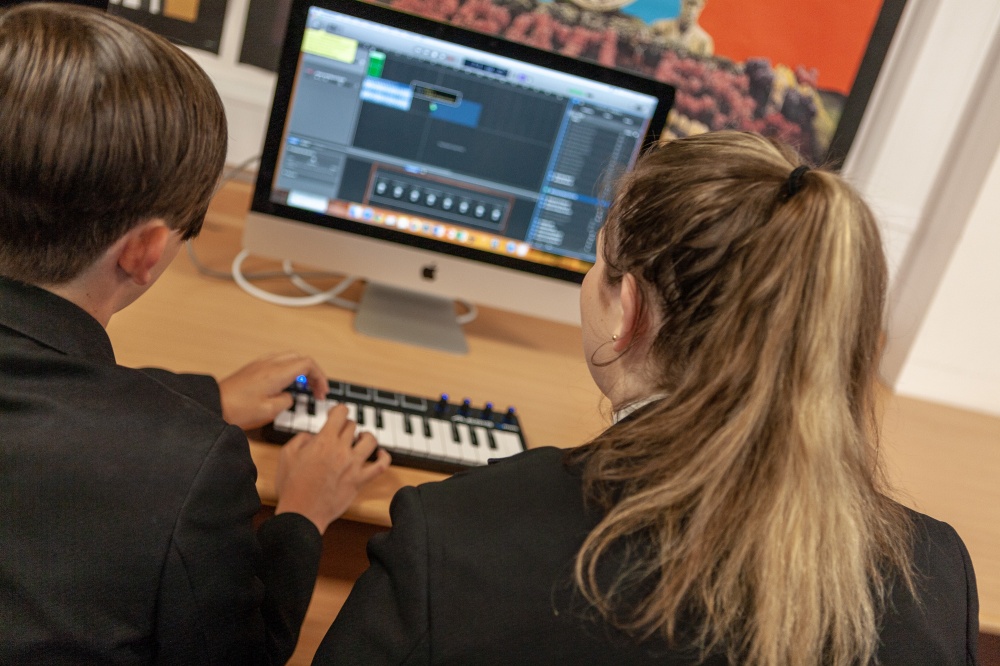
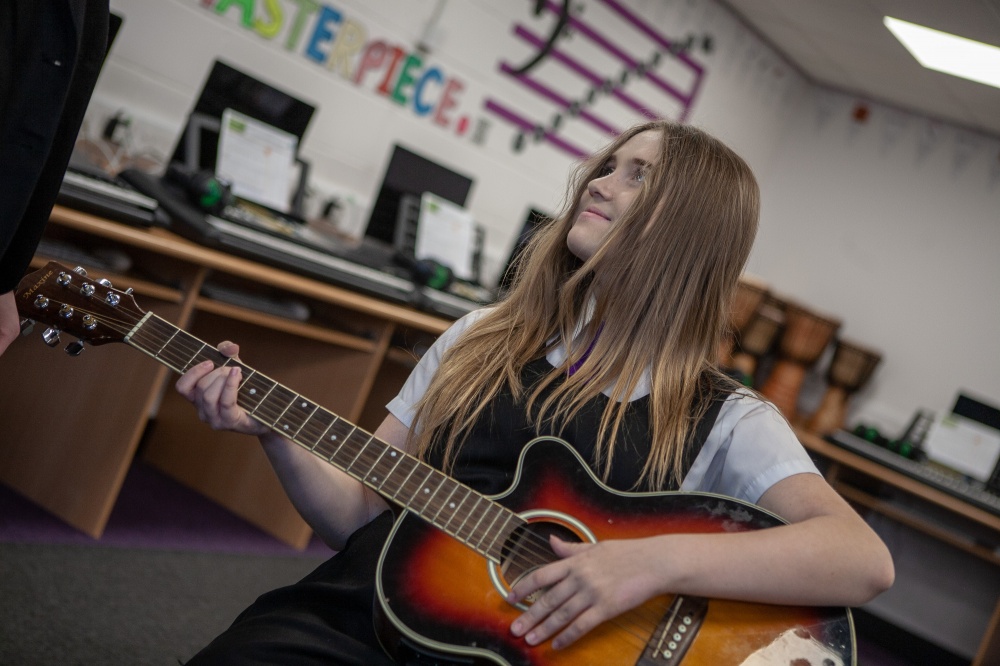
OCA KS3 Overview of Schemes 2022/23
Key Stage 3
Year 7
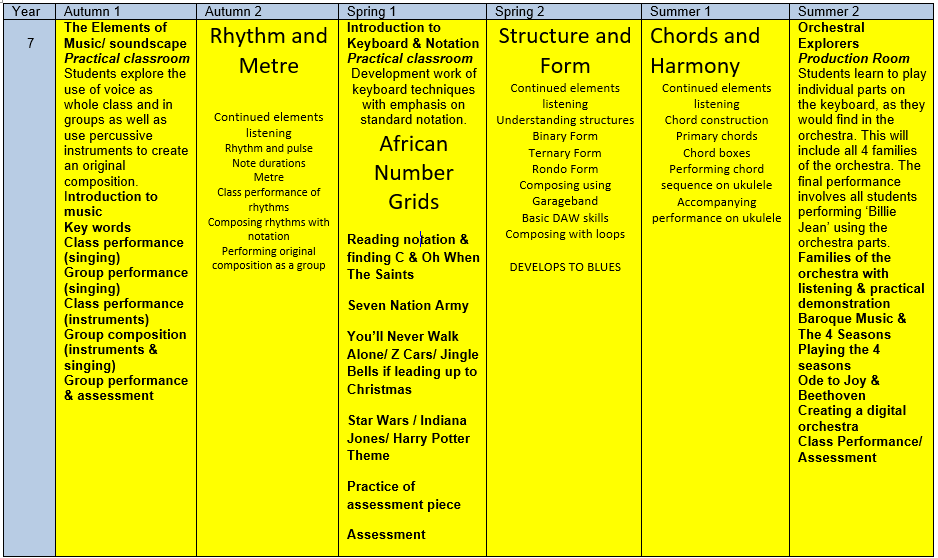
Year 8
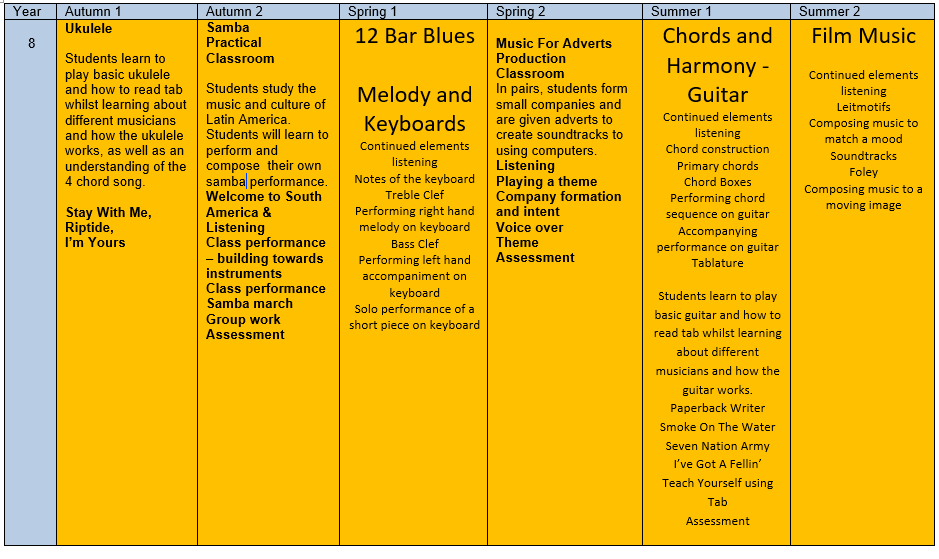
Year 9
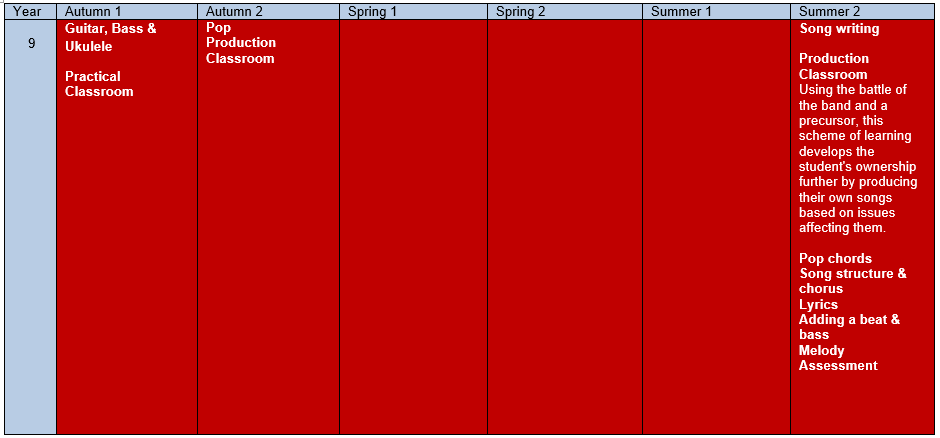
Year 10

Year 11

The music department offers a range of enrichment activities including free of charge peripatetic lessons, clubs, school ran shows and external trips.
Peripatetic lessons – Students have the opportunity to receive a twenty minute instrumental lesson on voice, drums, guitar, brass, woodwind and piano.
Choir – Non-auditioned choir for all year groups 7-11. The choir prepare performances for school shows throughout the year as well as events in the local community
Ukulele club – Weekly club that gives students the opportunity to learn how to perform on a ukulele. Students prepare performances for school shows and assemblies.
Music practice club – A weekly rehearsal club, giving students the opportunity to use instruments within the practice rooms.
Christmas show – The annual Christmas show takes place in December and students are encouraged to create performances to showcase in the event.
Recital evening – GCSE music show which showcases individual performances from the students
Halle orchestra trip – visit to Bridgewater Hall in Manchester to see the Halle Orchestra perform a range of classical music from different musical eras.
Theatre trips – students go to watch a variety of theatre productions including musicals in local venues.
Intervention – students in year 10 and 11 can participate in intervention sessions to work on composition coursework and complete revision in preparation for their exams.
KS3 Resources
- BBC Bitesize – https://www.bbc.co.uk/bitesize/subjects
- Instruments of the orchestra – https://www.orsymphony.org/
- Music quizzes – https://www.educationquizzes.com/
KS4 Resources
- BBC Bitesize Revision – https://www.bbc.co.uk/bitesize/
Quizlet – https://quizlet.com/en-gb/content/ - Past Paper – https://www.learnyay.co.uk/music/
- Listening Exercises GCSE Listening Practice Questions – https://www.youtube.com/watch
- Identify instruments – https://www.youtube.com/watch
- AOS Resources Mozart set work walkthrough – https://www.youtube.com/watch
- Horizon summary of AOS – https://www.youtube.com/
- Ear Training Teoria – https://www.teoria.com/en/exercises/
- Toned Ear – https://tonedear.com/


